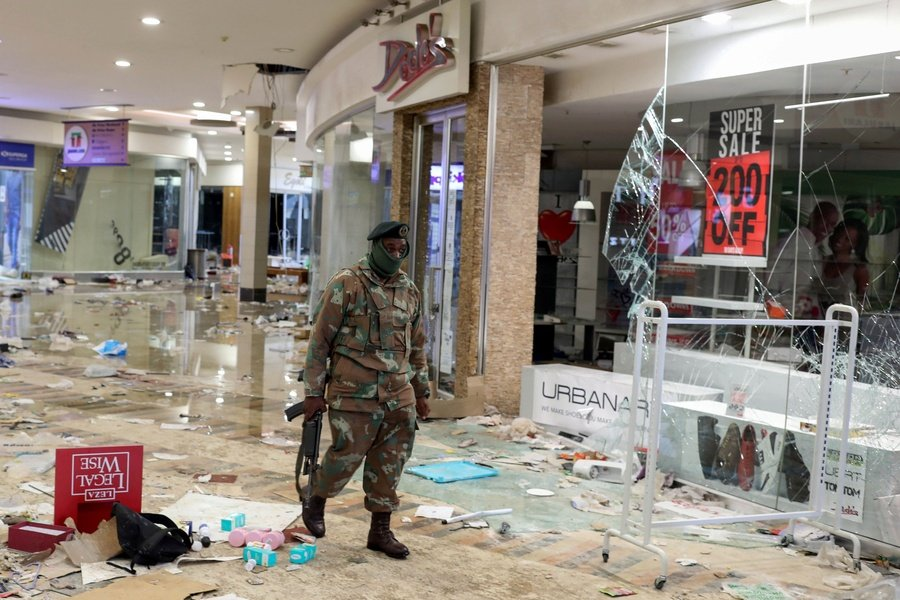The jailing of former President Jacob Zuma has exposed both the strengths and the shortcomings of the system of governance put in place following South Africa’s 1994 transition from apartheid to non-racial democracy.
South Africa is in the midst of urban rioting not seen since the end of apartheid. South African and international media carries pictures of mayhem featuring looted televisions and burned-out strip malls, and some commentators are saying that South Africa is what a failed state looks like. The ruling African National Congress (ANC) is in disarray. Supply chains are disrupted and the unrest is derailing the COVID-19 vaccination campaign. President Cyril Ramaphosa is mobilizing the South African National Defence Force (SANDF) to assist the police in restoring order. It is the worst of times in South Africa—at least since the end of apartheid.
However, the South African judiciary has reaffirmed the rule of law by sending to jail former President Jacob Zuma for contempt of court. The judiciary followed the spirit and the letter of the constitution. By jailing Zuma, it has reaffirmed that no South African is above the law. It has also struck a blow against a culture of official corruption. In terms of a democratic trajectory and the rule of law, it is the best of times in South Africa.
The rioting was triggered by Zuma’s jailing. It is indeed likely, if unproven, that some of Zuma’s political allies instigated the initial rioting, especially in his native KwaZulu-Natal. But, as the rioting has intensified and spread, it has morphed from protest over Zuma’s fate into an expression of deep-seated grievance among the poor and marginalized. In that sense, it is reminiscent of the urban rioting seen in the United States on the margins of the Black Lives Matter protests. COVID-19 is on the rampage and the Ramaphosa government has reimposed restrictions to try to contain it, causing widespread anger. The lackluster economy means high levels of unemployment and limited opportunities for youth. In many communities the ANC, ostensibly a “liberation” movement, is out of touch. Criminal gangs are active, taking full advantage of the breakdown of order.
Beyond Zuma and anger and frustration over COVID-19 and its restrictions, the dichotomy between South Africa’s best of times and worst of times reflects the gulf between the country’s remarkable success in building democratic institutions based on the rule of law and its much slower progress in meeting the material needs and aspirations of the majority of its people. The gulf between the white minority (less than ten percent of the population) and almost everybody else is little changed since the end of apartheid and, by some measures, has actually worsened. The economy is largely in white hands and those of a tiny black elite that has benefitted from various black empowerment schemes that have had little impact on the mass of the population. Severe poverty has indeed been reduced largely through a system of grants but without transforming the economy.
This dichotomy reflects the often overlooked reality that 1994 and the coming of Nelson Mandela and “non-racial democracy” was not the victory of a liberation movement. In effect, it was an agreement between two roughly equal elements: on the one hand, remnants of the apartheid coalition and other supporters of the status quo largely tied to a South African variant of liberal capitalism; and, on the other, the liberation movements and their supporters from abroad. In effect, the settlement of 1994 extended democracy and the participation in politics to the entire country, resulting in majority-black governance. But the economy largely remained in the hands of those that dominated it, and the constitution is a guarantor of private property.
At the time of the transition to non-racial democracy, especially within the ANC, there was the hope and expectation that a post-apartheid economy would grow so fast that the poverty of the mass of the population would be eliminated or at least ameliorated. There was particular expectation of a flood of American investment. That did not happen. Economic growth was significant nevertheless until Jacob Zuma came to power in 2009. Subsequently, international economic developments that depressed South African exports, mismanagement of the economy, and accelerating corruption have led to economic stagnation. These are the trends which President Ramaphosa seeks to reverse. Prosecution of Zuma for corruption is an important step forward.

